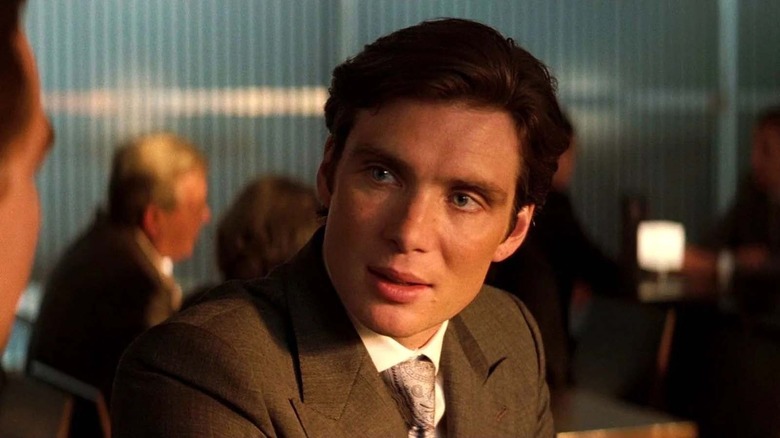
Christopher Nolan movies are an experience. That experience differs from film to film, from person to person, from concept to concept — but you are always left changed in some way, wholly different from the moviegoer you were two hours before. He uses many tools to cast this spell on you: his dreamlike yet intricately structured writing, his similarly intoxicating directing style, the sheer scope and breadth of the production design of his worlds, just to name a few.
But one thing that can really tie a film together in a bow for an audience is the acting, and Nolan has always had incredible actors in his corner and he knows how to use them to his and the actor's advantage. Take, for example, his work with Cillian Murphy. In all of his projects with Nolan, the Irish actor functions as a secret weapon, first as an unexpectedly menacing villain who provides firm groundwork for the hero he supports, and later as a surprisingly effective emotional constant.
The Menace Of Murphy's Scarecrow
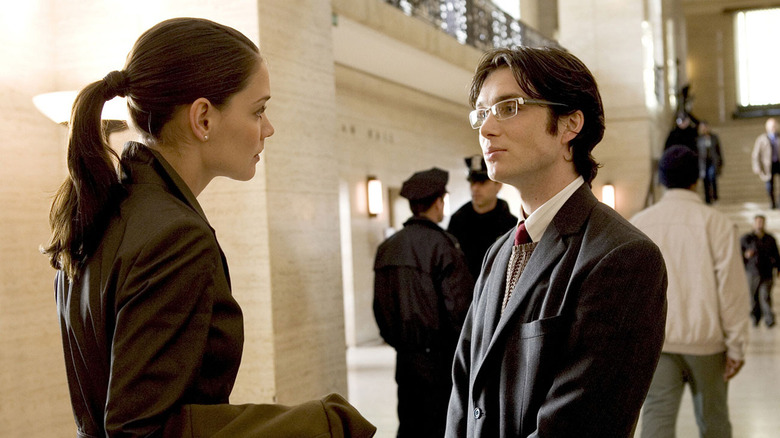
Murphy got his start with Nolan in "Batman Begins," the first of the "Dark Knight'' trilogy, but it was hardly his big break. A few years prior, Murphy gained recognition for his leading role in the vicious zombie classic "28 Days Later," but this time Nolan saw the actor as the zombie himself. He tasked Murphy with the role of Dr. Jonathan Crane, a brilliant yet corrupt psychologist who is secretly hellbent on releasing the crazy trapped inside Arkham Asylum onto the whole of Gotham City.
The "Peaky Blinders" star does an excellent job of balancing stable and full-out crazy between Crane the psychologist and Crane the Scarecrow, which is what he calls himself when he abandons his reality and dons a creepy rucksack mask to wreak havoc on Gotham. His menace has to be believable in order for Bruce Wayne's rise to have strength. The intensity of his ascension to the role of Batman and what that role means to Gotham actually hinges on Murphy's performance, similarly to how Heath Ledger's performance as the Joker functions in the second film "The Dark Knight." The evil has to be palpable, unmistakable, for Batman to have any purpose at all, and Murphy's brand of it works incredibly well. He is just the right type of unhinged, the kind that seems to plant a seed for the crazy villains we know and love, like the Riddler and the Joker. In fact, Murphy's Scarecrow should be in the conversation with both of them when it comes to their villainous archetypes — but it's clear that in Nolan's BCU, Murphy built the mold and, through that, he essentially gave the franchise its legitimacy.
The "Sunshine" star went on to have cameo appearances in both of Nolan's Batman sequels, where he rode the coattails of the reputation he built in the franchise. After his second appearance in the Gotham City universe, Nolan redirected Murphy's talents into a wholly different cinematic landscape.
Murphy's Emotional Core In Inception
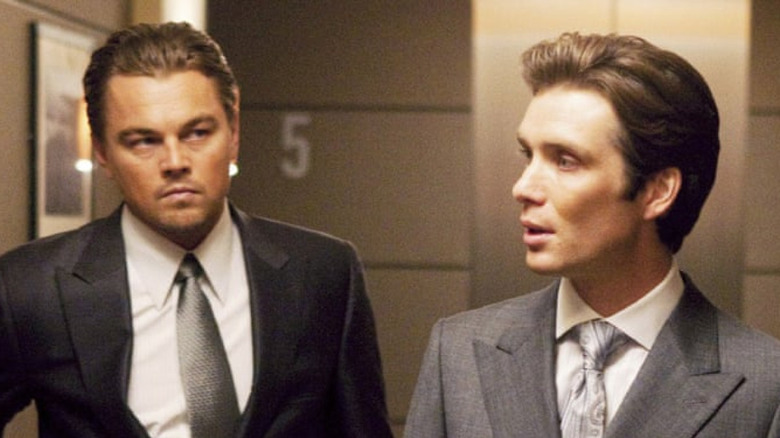
In 2010, Murphy appeared in Nolan's mind-bending original work "Inception," and the film truly forced the actor to step to the emotional plate. Whereas Murphy's function in the "Dark Knight" trilogy is believably heightened menace, he transforms into the emotional core of Nolan's intricate design through "Inception." His character, Robert Fischer, is the heir to a multibillion-dollar business conglomerate, and in no uncertain terms, he has the world at his feet. However, he's in the throes of inheriting his fortune from his dying father (the late Pete Postlethwaite), with whom his relationship is severely strained and nearly severed. So, when Leonardo DiCaprio's Dom Cobb is hired by a high-powered businessman named Saito (Ken Watanabe) to reprogram Fischer to leave his father's legacy behind, Cobb's team naturally targets the emotional repression of Fischer's mind to pull off the job. What unfolds is an almost systematic prodding of Fischer's subconscious until he becomes verklempt putty — and it becomes the hinge on which the film's integrity rests. In 2010, Murphy told Irish Central he saw Fischer as "a petulant child who's in need of a lot of attention from his father, he has everything he could ever want materially, but he's deeply lacking emotionally."
Murphy noted further about his character in the press notes during the film's original theatrical run:
"Despite his vast wealth, [Fischer] is riddled with all sorts of insecurities, as one might expect of someone who has lived his entire life in the shadow of a hugely powerful individual. It doesn't help that he has a very strained relationship with his father. So here you have a person who is about to inherit the world and is lacking for nothing except, perhaps, the thing he wants most: a proper relationship with his father."
It's one thing to write a character, but it's another thing to see that character come to life in the right way, and that's where Murphy showed up in spades. Armed with a deep understanding of the emotional stakes of the role, and the confines of the world of his character, Murphy's performance really just pours out of him during the film's most climactic scene — and that's so satisfying for the audience after watching his inner emotionality spittle from the tap in knowing glances and sharp retorts throughout the lead-up. It's a really special performance, one that wholly lays bare a fully changed man, rising from the phoenix-like ashes of honoring one's emotions.
Murphy Walks The Tightrope Of Dunkirk
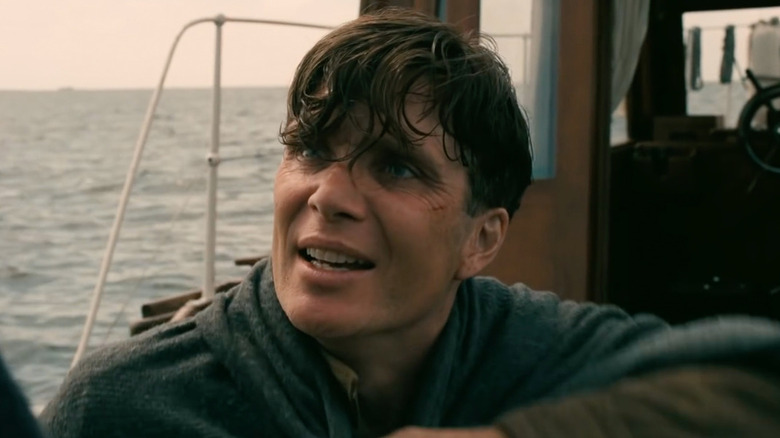
It's clear Nolan was as affected by Murphy's "Inception" performance because he cast the actor in another emotionally-charged role in his 2017 war epic "Dunkirk." Murphy's character is known only as a "shivering soldier" who is rescued by a civilian boat captained by a man named Mr. Dawson (Mark Rylance), his son Peter (Tom Glynn-Carney), and his son's friend George (Barry Keoghan), who joined the voyage to aid British soldiers at Dunkirk at the last minute. Murphy's character is panicked and frantic, desperate to survive the horrors this World War II fight has inflicted on him and other soldiers. When Mr. Dawson makes it known that his boat is headed right back into the action Murphy's character is so desperate to get away from, the soldier really loses it and accidentally pushes George down a set of stairs to the boat's lower deck in his hysteria. At first, he's defensive about the reality of George's injury, but with time, his defenses melt away.
Similarly to his turn in "Inception," Murphy was tasked with an emotional slow burn, but unlike the previous film, he was also tasked with bringing out the emotional life of his scene partners. In a way, this role combines the two things Nolan saw Murphy to be extremely good at: his intrinsic power to uplift his fellow actors and his innate ability to find the emotional center of a story. It's clear Murphy is a dream actor to work with; He gives so much while giving away very little. He has restraint, but it's not hollow. He works off emotion, using it like gasoline in a car. And boy is he efficient with the tank — it never runs out before you hit your destination.
What Can We Expect In Oppenheimer?
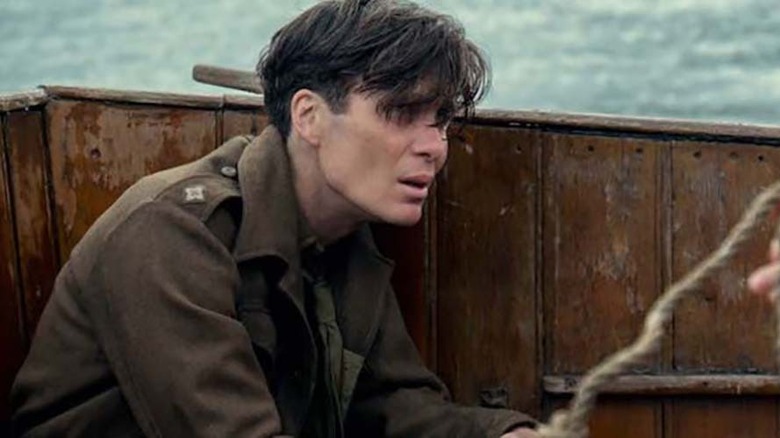
Knowing all of this, it begs one timely question: What should we expect from Murphy as he takes on the lead role of J. Robert Oppenheimer in Nolan's upcoming drama "Oppenheimer"? First off, Murphy assuming a leading role in a Nolan picture is a long time coming and I for one am happy to see it happening to someone who has such a firm grasp on how to build an emotional life for a character and weave it through his peers. And that's exactly what we'll be in store for — only this time, Murphy will be the central focus, and maybe his castmates will return the favor he's bestowed on so many throughout his work with Nolan and his career at large. Something tells me the "Oppenheimer" cast won't be able to help themselves.
Read this next: 14 Sequels That Truly Didn't Need To Happen
The post Cillian Murphy Has Always Been Christopher Nolan's Secret Weapon appeared first on /Film.
via Ecobuynow

.png)


Don't be spammer